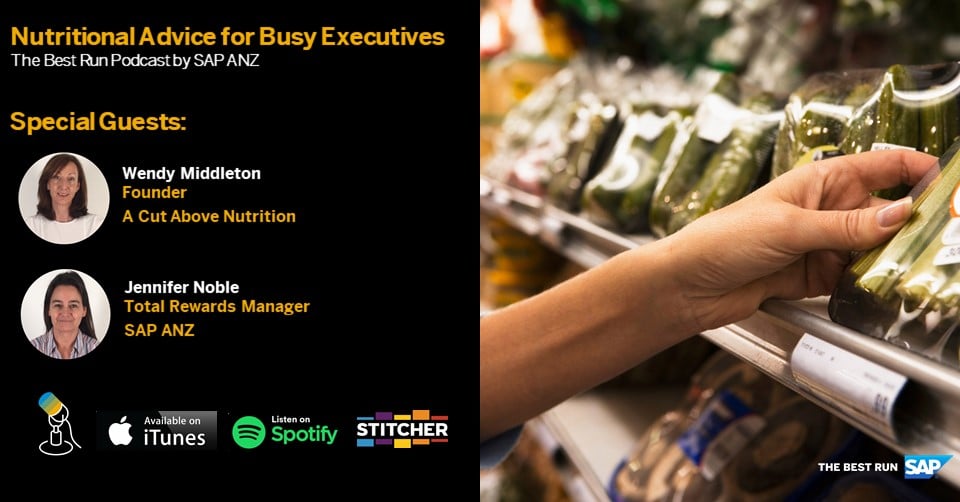In an increasingly busy world, often the first that suffers is our mental and physical well-being. On our most recent episode of The Best Run Podcast, I caught up with Wendy Middleton, Founder of A Cut Above Nutrition, and Jennifer Noble, Total Rewards Manager at SAP ANZ, to discuss health and nutrition for time-poor people.
As part of Jennifer’s role in SAP, she builds and designs well-being programs that help educate employees about health and nutrition. “It’s about being a multiplier and really taking the time to make employees invest in their own health, because ultimately, SAP is a very caring company and wants to look after our greatest asset, which are our employees,” she explained.
“We want them to be healthy and happy, hence the health and well-being program and the new Eat Well program that we’ve rolled out in ANZ over the last couple of years. It’s about the ecosystem really driving a healthy culture within SAP.”
Wendy is a qualified nutritionist and caterer who works closely with clients to not only inform them of food’s nutritional value; but instil healthy long-term eating habits that help improve overall well-being. She believes the first step to doing this is assessing eating habits. You can take stock through a number of ways, she said. “There are apps, we’ve got food-assessment tools, you can even use a Google Doc or just take photos of every meal and start some albums. Do it for at least three days; seven would be ideal – make sure one day is on the weekend, because they’re often quite different to what you’re having during the week.
“Then go back and look for patterns, such as ‘not enough veggies’, which is common. There was a study by the ABS in 2018 that established only 7% of Australians get the recommend five serves of veggies a day, which is startling. Then I would select one area where you would start to make a change. Please don’t overhaul your diet in one fell swoop – small steps are really the key to success.”
Wendy noted that a common problem is that many people often skip breakfast because they’re time poor or believe it can help weight loss. “I don’t mind when you have breakfast, as long as your first meal of the day is nourishing,” she explained. “You’ll have more energy, more focus, and be more productive.
“Breakfast also stops your carb cravings during the day and sets you up for healthy lunch choices, which is important because then you’re set up to choose a healthy dinner – so it’s creates this lovely flow-on effect. The other reason is that your metabolism peaks at the middle of the day, so it’s much better to have a nourishing breakfast when your body is firing well and can digest it.”
According to Wendy, the three critical elements to a healthy meal or snack are protein, carbohydrates, and healthy fats. “When you devour biscuits or chips, that’s carbohydrates – you need protein and healthy fat to slow the release of blood sugar into your system, which gives you a steady stream of energy.
“It can simply be boiling a couple eggs the night before, an apple, and some almonds – that could be your breakfast. It doesn’t have to be fancy. I love leftovers for breakfast; I think the more people that could eat dinner for breakfast, the better. Chia pudding is great. Things like granola are quite high in carbohydrates, so you need to add some protein like yoghurt, nuts and seeds, and then berries for the extra antioxidants.
Wendy notes that planning is critical to people being more nutrient-conscious in their eating choices. “You may plan your meals one week ahead, a couple days, or that morning,” she said. “I know I couldn’t plan a whole week; I prefer to wing it a bit more.
Don’t leave it to the last minute, because you’re going to walk in from work, look at your fridge while your body is dropping in blood sugar level, so you’ll be craving carbs and grab the wrong food. Also, whenever you’re cooking, make double and put that extra portion away before you eat because you tend to come back and eat it.”
Jennifer expressed how important it is for employers to help increase nutritional awareness amongst staff. “In SAP’s kitchen areas, I’ll have a chat with employees about coming out with healthier options and we always have fruit available to our employees,” she explained. “I think people are really starting to think about their food choices more and starting to change their habits.
“Last year when we rolled out Healthy Habits One Simple Thing, it’s about making small changes and doing everything in moderation. It’s not about throwing everything out the window; it’s just about changing the mindset and our relationship with food.
Jennifer has seen the efficacy of SAP’s health and well-being programs as employees have started changing their eating habits and encouraging others. “It’s having a multiplier effect because people are talking about it, creating groups, and sharing recipes,” she said.
“I think it’s also about how we can use technology more effectively for everyone to be better informed about their food choices. At SAP, we’re focused on how we can build that technology to support the health and well-being of our employees and help the general community run better.”
As both my guests noted, health and well-being can have a dynamic impact on the way people and organisations operate. SAP continues to demonstrate its dedication to employees’ physical and mental well-being by running regular programs and seminars that encourage healthier habits. Organisations that are conscious of staff’s overall health and well-being are often more productive and are seen by employees as great places to work and grow.
Listen now and get some great nutritional advice for the busy executive.




